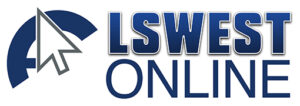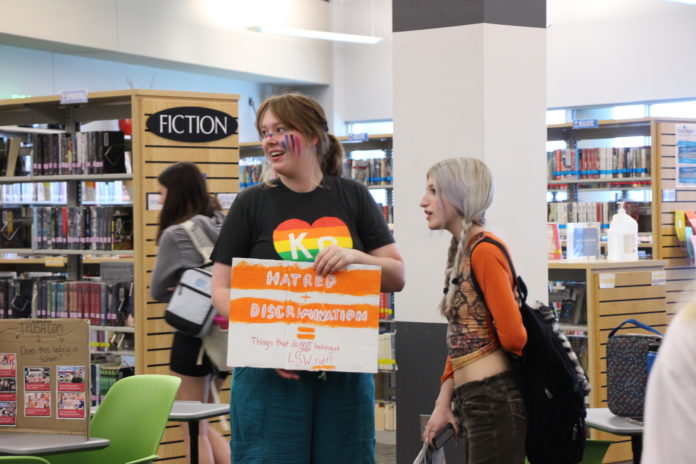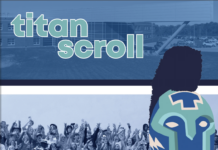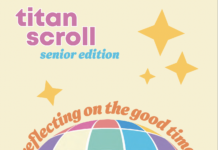Emily Gerhart and Ellie Johnson
On Tuesday, May 17 during Titan Time, a group of students held a meeting for West’s newest student-led organization: a Turning Point USA (TPUSA) chapter at West. For the first time in recent history, other students gathered to protest and petition the meeting throughout the school grounds.
“I wanted a Turning Point chapter here at West because I’ve seen the things they’ve done at other high school and college campuses. They really just create a safe space for young conservatives or just really people that just want to have conversations over topics that aren’t really portrayed in the media anymore,” President of LSW TPUSA junior Kali Michael said. Michael said that throughout high school she has faced judgment and shame for her political stance and morals. “Some of the other students feel the same way, so I just wanted a place for [us].” A student-led organization is defined in the LSR7 District, as “completely student led, and they don’t have a sponsor at all. They actually have a person who just supervises their meetings, the adults are not involved in the conversations, not involved with the club, they are just there to make sure that the students who are meeting are supervised,” said Principal Dr. Chad Hertzog.
Any group of students at West can create a student-led organization about any topic, as long as administration approves that they have a staff supervisor and a scheduled space. “Any student who wants to come, regardless of their beliefs, has the opportunity to come to those meetings. And they are essentially meetings that allow free speech to occur. Students can have meetings about whatever topics they choose, as long as they’re supervised, and as long as school rules are followed while they’re there.”
Michael said they were approved by administration and reserved the collab lab, and started advertising the meeting through the halls and on social media. “All we would do is just have meetings once a week or twice a week. And we wouldn’t really do anything besides one semester, we have to have some sort of activism initiative, which means like you go out in the community, we have a debate or a panel, or we have a guest speaker, things like that,” Michael said.
When some students, including sophomore Noah Symes and junior Faith Glasgow, started to catch word of this club, they opposed it. “Turning Point USA is a national right-wing political organization. They work inside high schools and inside college campuses and we find a lot of their ideas that they push to be discriminatory and hateful and problematic. And that’s why we don’t want that national organization coming into our public high school,” Symes said.
“The first interaction with the Turning Point USA potential group or club was posters on the wall. And when I saw those, I knew what Turning Point USA does, and I was confused…So, me and a bunch of debate kids, including Noah, kind of got together and were like, I don’t think we agree with this. And frankly, we don’t want any third party organization that has any political affiliation to be at Lee’s Summit West High School,” Glasgow said.
Glasgow said they decided to create a write-up to send to Dr. Hertzog about the meeting. Along with Symes and juniors Ava Wischnewski and Harper Barnard, she wrote an eleven page petition.
“The petition statement is that Lee’s Summit West High School should in no way be affiliated with Turning Point USA,” Glasgow said. “It’s nothing against conservative ideals, against right wing values that they hold. It is simply: we do not want a third party organization, specifically an organization that is notorious for anti-LGBTQ rhetoric and anti-black rhetoric, in Lee’s Summit West High School.”
Glasgow said that she believes having a “chapter leader” associated with a student-led organization does not fit protocol. “If you’re having a chapter leader that’s organizing and constantly contacting you, and giving you opinions, and you’re following the quote —unquote curriculum that is provided to you by Turning Point USA, it’s not student-led,” Glasgow said.
“We decided, as we were writing, that we should have a protest,” Glasgow said. “So, we created an infographic and sent it out on all social media platforms, told people to repost it, and it worked.”
“When I heard that there were going to be protests, I wasn’t really shocked. I mean, I knew that there was going to be backlash just because of the date or the time that we live in now,” Michael said.
Michael said that the group decided to affiliate with Turning Point USA because of the “many benefits…They’ll send us to conferences. They’ll send us guest speakers. There’s other organizations, like at Liberty North, or UMKC, that have Turning Point USA chapters that we’d be able to meet up with. So, like those benefits, as well and we just really want to be affiliated with them because they have the same mission statement as us. They want the same things as us. They have the same goals and we just like everything that they are out to do in the community.”
Glasgow said the petition against the organization “talks about LGBT discrimination and talks about transphobia. It discusses how Turning Point USA often creates turmoil within school districts. And we can see that within the status quo that’s already happened with news articles coming out and us being described as quote unquote, insane leftists. It’s really disturbing. The other portion of it was gun violence being promoted within schools or armed guards being brought in schools. We don’t allow firearms on the property according to the Missouri Safe Schools Act. And that was in direct contrast to feelings that TurningPoint USA is associated with.”
This made up all of the sections in the write up, along with student testimonies. Glasgow said that the original protest was set to meet in the LMC, outside of the Collab Lab, so that there would be “no interference with the actual meeting, but we did want to be right by it, in case we would get the opportunity to ask questions.”
Michael said that although she knew there was opposition, the meeting was still on. She said she had to squeeze through a crowd to get to the collab lab to start presenting. “Because of the library having a 90 person limit, we were unable to have as many people as we wanted to be inside. There were people protesting in the courtyard, and on the balcony, in the stairwell, in the hallways and in the library- not just the collab lab itself. It was very rowdy and just kind of loud in here. But then finally, we got to get through our presentation. The protesters were quiet for the most part. I mean, they did shout some things during the presentation,” Michael said.
“The turnout was way larger than expected,” according to Glasgow, and the petitioners managed to collect over 500 signatures. “The hallway was completely crowded, and you could not move. It was suffocating.”
Hertzog said administration was in the LMC, and closed its doors when it was at full capacity. “There were a significant, large number of students who still wanted to get into the LMC. And because of this meeting, and we told them no, you it’s closed this point, it is full. But if you’d like to continue to voice your opinion on this, do so in the courtyard,” Hertzog said. “The students in the courtyard really just sort of just existed, like they would during any Titan Time…Some wer4e voicing their opinion on this, others were just standing around watching up in the library, the meeting occurred in the Collab Lab.”
Michael said that at the end of the TPUSA meeting it was open to questions. “One person was able to ask a question, and when I answered, saying that we were nonpartisan and that we weren’t going to discuss any moral issues, everyone got very disruptive,” Michael said.
The meeting began very civilly, according to Hertzog, but then became too unorganized to continue, with Assistant Principal Jesse Dziurawiec stepping in to end the meeting.
Senior Mathew Kimaku said he attended the meeting to support his friends running the club and hear out the club’s mission to separate fact from rumor.
“[The club officers] talked for maybe five minutes, and then they opened it up to comments and questions and that’s when it started going downhill. They started accusing them of being homophobic immediately, without really posing questions,” Kimaku said. “Eventually, there started to be a lot of yelling and screaming, and that’s when administration came in.”
As the meeting was starting to heat up, a senior student came through the doors and “flipped over the glass table and then walked away,” according to Michael. And that is what was seen in the viral video surrounding the meeting.
Kimaku said, “He came through the back door, flipped the table, all the glass shattered, and that’s when administration shut it all down.”
Michael, Glasgow, Symes, and Hertzog all concluded that the student who caused the incident acted alone.. Hertzog reported that no one was harmed.
“Thankfully, no one was hurt…I know the protesters even told me that they didn’t intend for this to happen. And I completely understand. But when people say that that was just the one incident that wasn’t peaceful. I mean, our banner was stolen, our materials were stolen and broken. They weren’t listening to our Vice Principal. They weren’t being quiet and calm and having just a conversation,” Michael said.
Symes said that he acknowledges the incidents that shouldn’t have happened, but that the protest was still peaceful. “This absolutely was a peaceful protest, even the protesters that were actually inside the collab lab that were not affiliated with the protest happening outside. They still remained peaceful, even if they were loud,” Symes said. “As for the person who flipped the table, he was a complete solo actor.”
Michael said that she understands the people that were at the meeting for the right reasons, even though it got out of hand. “I’ve had conversations with some of them that said ‘all we just wanted to do was share a voice. I just wanted to ask a couple questions’, and I understand those people. But, there was a majority that were just being loud and disruptive during. So, I wouldn’t call that peacefully protesting. But I understand the other people that were there that just wanted to have a calm conversation,” Michael said.
Glasgow and Symes, who attended a private meeting with Principal Chad Hertzog during the club’s scheduled debut, were not present in the collab lab to witness the meeting or control students.
“I think there were unfortunate circumstances that came about from isolated and individual incidents that occurred. We posted all over social media, no violence should be tolerated at these protests at all. That petition statement is exactly what I still believe in. Talking to Dr. Hertzog was very productive. In my opinion, I got a lot of information about district policy… I don’t think I could change anything. I just wish some people had reacted differently,” Glasgow said.
Hertzog said, in an announcement to the school on Wednesday, that administration takes full responsibility for the situation that unfolded during Tuesday’s meeting and protests. Moving forward, the district will review policy on “what it means to be a club,” according to Hertzog, to prevent another incident.
“I don’t want it to be protested,” Michael said. “I want people to want a place where you can have a conversation. And what I said in my presentation is I want people who have different perspectives to come in and have a discussion over capitalism, limited government, socio-economics, things like that, conservative values, our freedoms and rights. And then even if we don’t agree, or we don’t find common ground, I want to be able to leave civilly. And as friends, I mean, we’re going to go to the same high school, we’re going to be involved in the same clubs, we’re going to be involved in the same sports, we should be civil and stay friends, even if we can’t agree on certain topics,” Michael said.
For the future of TPUSA at West, Michael said she will keep pushing. “I 100% percent know that it will be approved. Because, it doesn’t matter how many people disagree or don’t want this to happen. Just because you don’t want a club to happen doesn’t mean that’s a right for them not to be approved.”
While Michael will continue to push her mission alongside Turning Point, Glasgow and Symes both said they are unmoving in their quest to ensure West is TPUSA free.
“Honestly, at this point, I think district policy needs to change. We’ve never had a third party organization attempt to set a chapter in the Lee’s Summit R-7 School District. And I don’t think any teachers or administrators are prepared for that, or were prepared for that,” Glasgow said.
“I would love for the people that started the Turning Point USA club to create a conservative club, to create a right wing club, to create a free market or capitalism club. They can have discussions about politics and economics productively without having a known transphobic and racist organization come in and be a part of it,” Glasgow said.
Michael said, “all of the allegations that are thrown around about Turning Point USA are false…I mean, there’s going to be extremists that associate themselves with certain organizations on either side. And so, you can pick out a few people on one side or the other, but that doesn’t mean they represent the organization as a whole. If you look at their mission statement, all they want to do is spread conservative values and the truth.”
“We just want to say what we believe in as conservatives and want to be able to spread our message because of the media in today’s age, that really just pushes down what we believe in. We just want to save space for that. So people don’t, because of the protesters, people probably wanted to support us but felt judged or shamed by other people. And I just want there to be a space for us to be able to have conversations. That’s all Turning Point USA is about, it’s just to bring back the value of discussion,” Michael said.
“Since Tuesday, I think it became very evident that we need to look at number one: What we allow to happen during our school day. We allow all clubs or groups to meet— Is that the best thing we should be doing or should we or should we really be protecting our instructional day from any distractions, and only allow clubs to meet before after school, that’s a conversation that we need to have,” Hertzog said.
“I think an additional conversation point is how do we continue to provide spaces that are available for everyone to feel like they can express their viewpoint, but then do so in a civil way. Like obviously, Tuesday showed us that it was really difficult for a group of students to come together with their thoughts around this outside organization, or whatever their message was, and have that meeting, inform others of what they wanted to do, without there being opposition that got a little bit heated,” Hertzog said.
“I think all clubs need a safe space…To me, I think everybody needs to feel like they have the ability to meet in the school, using the structure we put in place, whatever it is, before school, after school, Titan Time, to have their conversations that are protected by free speech, and be able to talk and be civil and not feel like they can’t express who they are and what they believe. Now you have to be able to do that within school rules. You’ve got to be able to do that without, you know, hurting other people while you’re doing it. All those things have to happen. But we do need to provide spaces for people to be able to have conversations.”
As for how far this will go, Hertzog said LSR7 will have to evaluate what is, and isn’t allowed by board policy. “I think that’s what clarity both sides need— Is this allowed? Is it not? What kind of school groups exist? What options exist to each of those school groups? In terms of meetings? There’s a lot to be answered before the next school year starts, not just for not just for the new club that’s starting, but [for] any other groups.”
“What you do for what you do for all, that’s, that’s a common thread amongst how we operate with clubs. If you allow these groups of people the opportunities to have their meetings and have their conversations, and they’re operating within your board policy, every other group should have the same protection to be able to have their meetings and operate under board policy,” Hertzog said. “That is the difficult piece because we have opposing viewpoints. Both people think that their viewpoint is correct and there usually has to be a middle ground everybody agrees to. That, I think, is where we need to get to.”














